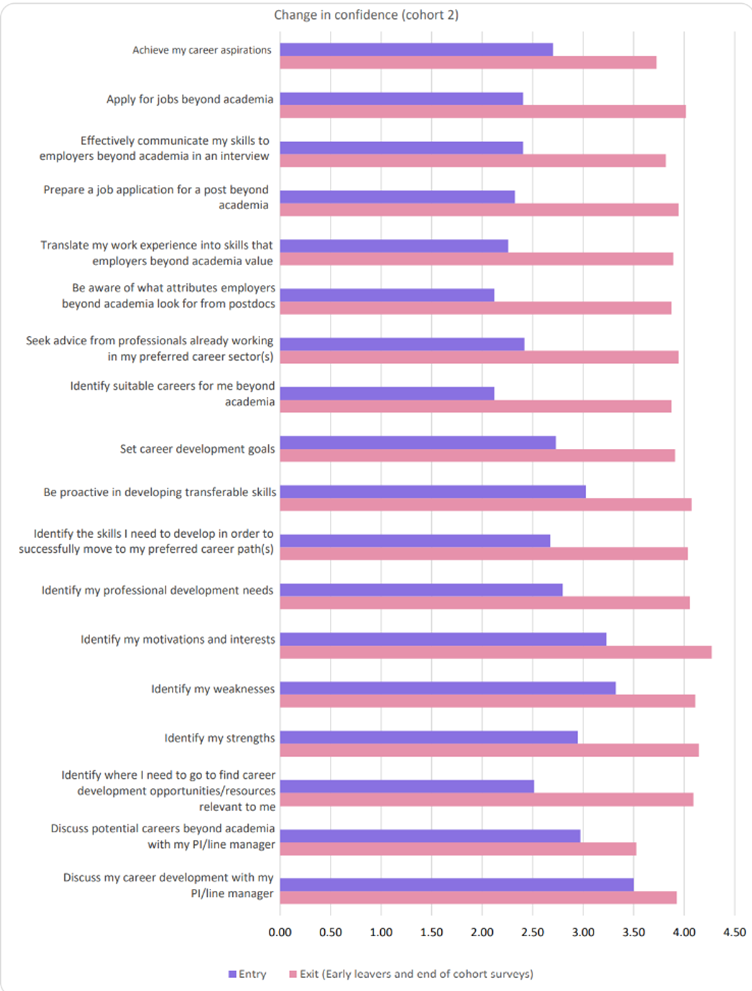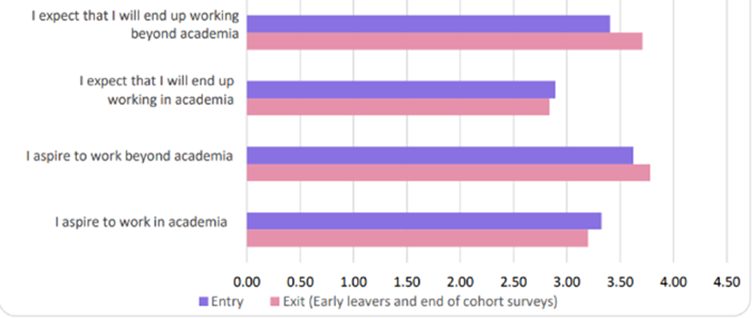Prosper’s second career development pilot cohort – involving over 120 postdocs across the Universities of Liverpool and Manchester and Lancaster University – ended in February 2023.
A lot has happened since. Over the spring and summer, we worked to bring together materials and content from our pilots into a sleek and accessible online hub – the Prosper portal – for free use by postdocs, managers of researchers and Higher Education institutions across the country.
In May, with the development phase of Prosper coming to a close, UKRI announced extra funding to accelerate adoption of Prosper across the sector. In September, we marked National Postdoc Appreciation Week by formally launching Prosper across the UK. Since then, we’ve been working with institutions to encourage use of our model and associated resources. We’ve also been preparing for the first ‘Business as Usual’ postdoc career development cohort at the University of Liverpool, which begins this month.
Along the way, as with the first pilot, we’ve been crunching the numbers to produce a comprehensive evaluation of our second pilot cohort. As well as looking at the impact Prosper had on postdocs in our second cohort, it also combines data from both pilot cohorts, taken as a whole.
The detailed evaluation report is available for download here. In summary:
- Postdocs in the second cohort showed significant improvement in their confidence across 18 measures of ability relating to career development – particularly the ability to self-reflect and make proactive career plans, communicate with employers and apply for jobs beyond academia, and identify career development resources and goals.
- Participants showed increased openness to the possibility of someday working beyond academia.
- The majority reported using what they had learned to engage employers and explore opportunities and roles in their own time, beyond the confines of the pilot itself, and two-thirds of the cohort reported putting their newfound skills to work in applying for new roles.
- A significant number of participants have gone on to secure new roles at a diverse array of organisations. Destinations include a charity that specialises in improving outcomes for disadvantaged pupils, AI research, EUMETSAT, and the Department of Transport.
Improved Confidence
One of Prosper’s core aims is to engender a change in postdocs’ mindsets regarding how they think about themselves and their future. Over the course of both pilots, we tracked participants’ confidence levels across 18 areas related to different aspects of personal career development, measured on a five-point Likert scale score.
Participating postdocs showed a marked improvement across all 18 variables:

Participants showed significant growth in their ability to self-reflect and make proactive career plans, communicate with employers and apply for jobs beyond academia, and identify career development resources and goals. The most pronounced improvement was seen in areas relating to translating experience and skills for employers, and awareness of what employers beyond academia look for in candidates.
Broadened career horizons
Another of Prosper’s key aims is to enable postdocs to broaden their career horizons and understand the true breadth of options open to them, whether within or beyond academia.
As with the confidence variables, we asked members of the cohort to record their aspirations and perceptions regarding what they envisaged for the future of their careers and tracked these variables over the course of their engagement with Prosper. We found an overall increase in postdocs both aspiring and expecting to one day work beyond academia, and an attendant fall in the converse:

Increased pro-activity
Away from transforming mindsets, one of Prosper’s more outcome-focused objectives is to encourage and enable postdocs to more actively pursue career opportunities by engaging with a wider range of employers beyond academia – not just through job applications themselves but also through professional networking and informational interviews.
Over the course of the year, 73% of the cohort explored opportunities or otherwise engaged and interacted with a range of employers beyond the confines of the Prosper pilot. 37% had conducted informational interviews with employers. In terms of concrete job applications, two thirds reported using what they had learned to apply for jobs during the timeframe of the pilot.
Inspiring career outcomes
A significant number of the second cohort postdocs were able to parlay their newfound skills into securing new roles, both within and beyond academia, during the time frame of the pilot. The diversity of roles secured beyond academia are testament to the attractiveness of postdoc candidates to a wide range of organisations and sectors.
These are ‘early days’ with regard to both cohorts – Prosper aims to help postdocs develop skills and attitudes that will serve them well wherever their career takes them over the long-term. Accordingly, we are longitudinally tracking the careers of postdocs from both of our pilot cohorts over the next few years. Indeed, in the year since the second pilot, several more of the postdocs have gone onto secure new roles both within and beyond academia.
These are just some of the headline findings relating to the second cohort – for a more in-depth analysis as well as a combined analysis of both cohorts, you can read and download the full report here.
We’d like to thank all of the pilot participants across both cohorts for their enthusiasm and engagement Their input was crucial to the creation of our final model and associated portal, which is now available to the whole sector.
We believe the report evidences the impact career development interventions can have on postdocs. Prosper's mission now, following launch, is to see this replicated as widely as possible across the sector, so that postdocs across the UK can get the same benefits as a matter of course.






 Refine
Refine

